University Essay: Japan's Economic and Military Rise in WWII
VerifiedAdded on 2022/09/09
|5
|1346
|17
Essay
AI Summary
This essay examines the emergence of Japan as an economic and military power during World War II. It highlights the rapid economic and military development between 1937 and 1945, including significant increases in manufacturing, steel, and machinery. The essay explores the militarized economy, societal changes, and the role of Emperor Hirohito in boosting military strength. It also discusses the impact of the war on the Japanese society, the involvement of men, women, workers, and peasants, and the implications of Japan's colonial practices in Korea and China. The conclusion emphasizes the profound effects of WWII on Japan's lifestyle, economy, and military, establishing it as a major Asian power. The essay references various academic sources to support its arguments.
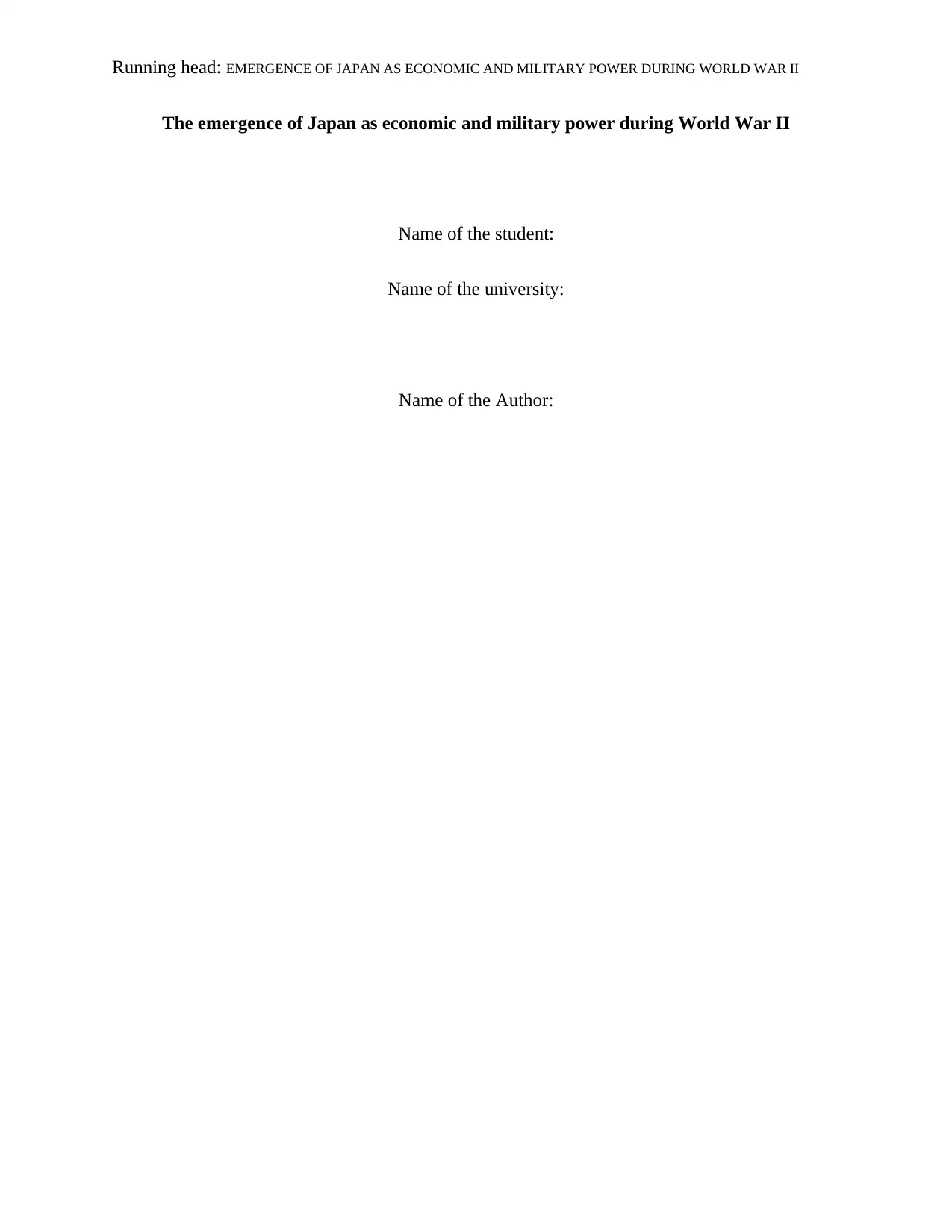
Running head: EMERGENCE OF JAPAN AS ECONOMIC AND MILITARY POWER DURING WORLD WAR II
The emergence of Japan as economic and military power during World War II
Name of the student:
Name of the university:
Name of the Author:
The emergence of Japan as economic and military power during World War II
Name of the student:
Name of the university:
Name of the Author:
Paraphrase This Document
Need a fresh take? Get an instant paraphrase of this document with our AI Paraphraser
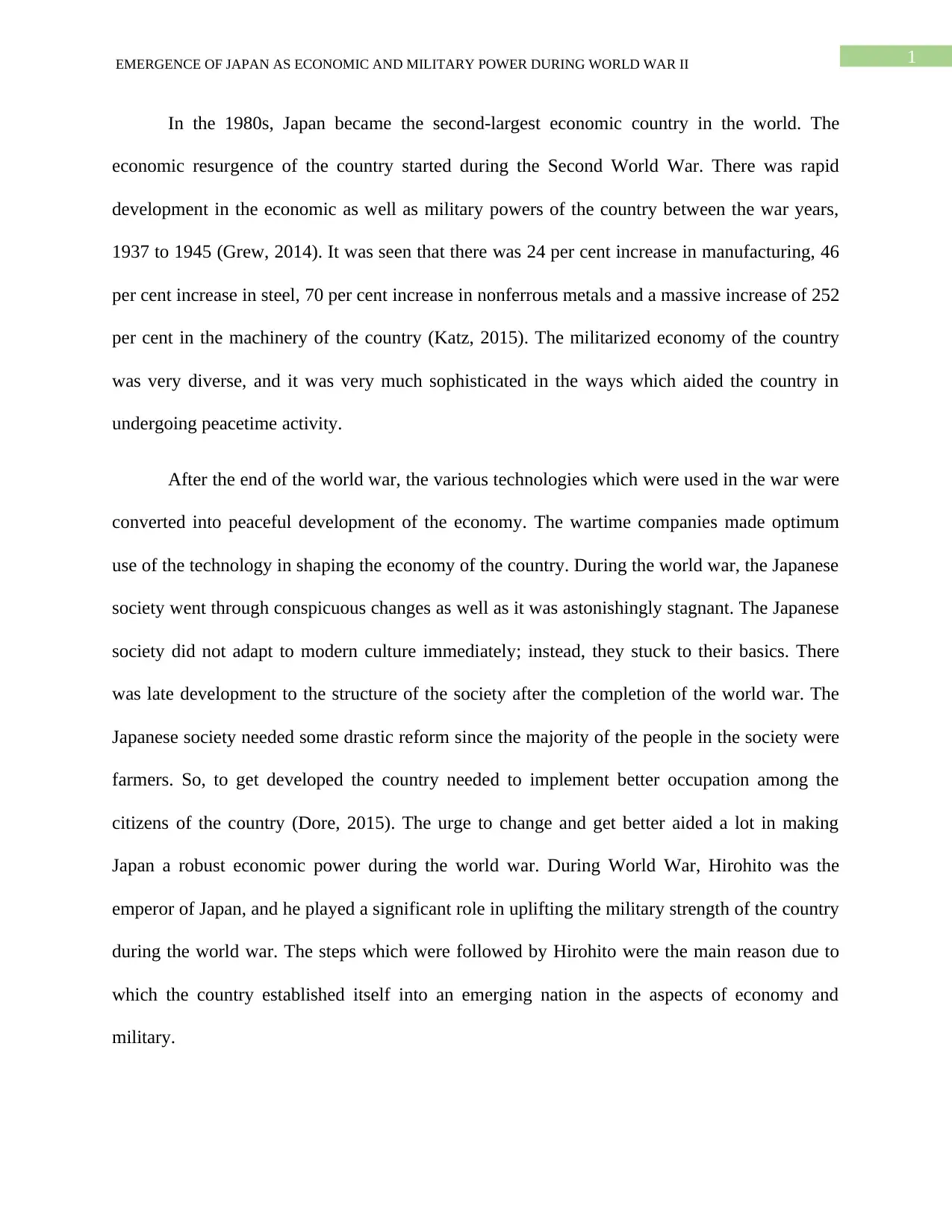
1EMERGENCE OF JAPAN AS ECONOMIC AND MILITARY POWER DURING WORLD WAR II
In the 1980s, Japan became the second-largest economic country in the world. The
economic resurgence of the country started during the Second World War. There was rapid
development in the economic as well as military powers of the country between the war years,
1937 to 1945 (Grew, 2014). It was seen that there was 24 per cent increase in manufacturing, 46
per cent increase in steel, 70 per cent increase in nonferrous metals and a massive increase of 252
per cent in the machinery of the country (Katz, 2015). The militarized economy of the country
was very diverse, and it was very much sophisticated in the ways which aided the country in
undergoing peacetime activity.
After the end of the world war, the various technologies which were used in the war were
converted into peaceful development of the economy. The wartime companies made optimum
use of the technology in shaping the economy of the country. During the world war, the Japanese
society went through conspicuous changes as well as it was astonishingly stagnant. The Japanese
society did not adapt to modern culture immediately; instead, they stuck to their basics. There
was late development to the structure of the society after the completion of the world war. The
Japanese society needed some drastic reform since the majority of the people in the society were
farmers. So, to get developed the country needed to implement better occupation among the
citizens of the country (Dore, 2015). The urge to change and get better aided a lot in making
Japan a robust economic power during the world war. During World War, Hirohito was the
emperor of Japan, and he played a significant role in uplifting the military strength of the country
during the world war. The steps which were followed by Hirohito were the main reason due to
which the country established itself into an emerging nation in the aspects of economy and
military.
In the 1980s, Japan became the second-largest economic country in the world. The
economic resurgence of the country started during the Second World War. There was rapid
development in the economic as well as military powers of the country between the war years,
1937 to 1945 (Grew, 2014). It was seen that there was 24 per cent increase in manufacturing, 46
per cent increase in steel, 70 per cent increase in nonferrous metals and a massive increase of 252
per cent in the machinery of the country (Katz, 2015). The militarized economy of the country
was very diverse, and it was very much sophisticated in the ways which aided the country in
undergoing peacetime activity.
After the end of the world war, the various technologies which were used in the war were
converted into peaceful development of the economy. The wartime companies made optimum
use of the technology in shaping the economy of the country. During the world war, the Japanese
society went through conspicuous changes as well as it was astonishingly stagnant. The Japanese
society did not adapt to modern culture immediately; instead, they stuck to their basics. There
was late development to the structure of the society after the completion of the world war. The
Japanese society needed some drastic reform since the majority of the people in the society were
farmers. So, to get developed the country needed to implement better occupation among the
citizens of the country (Dore, 2015). The urge to change and get better aided a lot in making
Japan a robust economic power during the world war. During World War, Hirohito was the
emperor of Japan, and he played a significant role in uplifting the military strength of the country
during the world war. The steps which were followed by Hirohito were the main reason due to
which the country established itself into an emerging nation in the aspects of economy and
military.
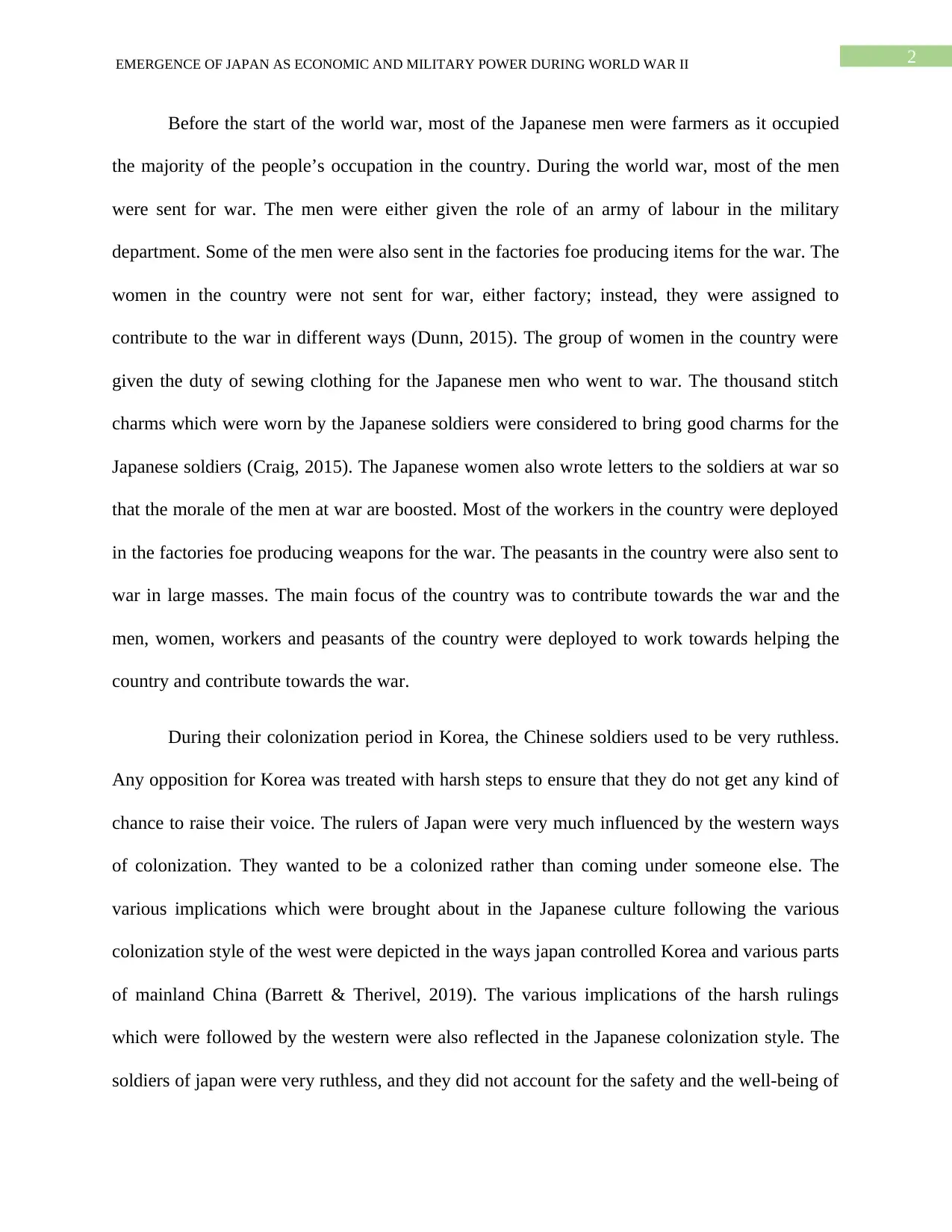
2EMERGENCE OF JAPAN AS ECONOMIC AND MILITARY POWER DURING WORLD WAR II
Before the start of the world war, most of the Japanese men were farmers as it occupied
the majority of the people’s occupation in the country. During the world war, most of the men
were sent for war. The men were either given the role of an army of labour in the military
department. Some of the men were also sent in the factories foe producing items for the war. The
women in the country were not sent for war, either factory; instead, they were assigned to
contribute to the war in different ways (Dunn, 2015). The group of women in the country were
given the duty of sewing clothing for the Japanese men who went to war. The thousand stitch
charms which were worn by the Japanese soldiers were considered to bring good charms for the
Japanese soldiers (Craig, 2015). The Japanese women also wrote letters to the soldiers at war so
that the morale of the men at war are boosted. Most of the workers in the country were deployed
in the factories foe producing weapons for the war. The peasants in the country were also sent to
war in large masses. The main focus of the country was to contribute towards the war and the
men, women, workers and peasants of the country were deployed to work towards helping the
country and contribute towards the war.
During their colonization period in Korea, the Chinese soldiers used to be very ruthless.
Any opposition for Korea was treated with harsh steps to ensure that they do not get any kind of
chance to raise their voice. The rulers of Japan were very much influenced by the western ways
of colonization. They wanted to be a colonized rather than coming under someone else. The
various implications which were brought about in the Japanese culture following the various
colonization style of the west were depicted in the ways japan controlled Korea and various parts
of mainland China (Barrett & Therivel, 2019). The various implications of the harsh rulings
which were followed by the western were also reflected in the Japanese colonization style. The
soldiers of japan were very ruthless, and they did not account for the safety and the well-being of
Before the start of the world war, most of the Japanese men were farmers as it occupied
the majority of the people’s occupation in the country. During the world war, most of the men
were sent for war. The men were either given the role of an army of labour in the military
department. Some of the men were also sent in the factories foe producing items for the war. The
women in the country were not sent for war, either factory; instead, they were assigned to
contribute to the war in different ways (Dunn, 2015). The group of women in the country were
given the duty of sewing clothing for the Japanese men who went to war. The thousand stitch
charms which were worn by the Japanese soldiers were considered to bring good charms for the
Japanese soldiers (Craig, 2015). The Japanese women also wrote letters to the soldiers at war so
that the morale of the men at war are boosted. Most of the workers in the country were deployed
in the factories foe producing weapons for the war. The peasants in the country were also sent to
war in large masses. The main focus of the country was to contribute towards the war and the
men, women, workers and peasants of the country were deployed to work towards helping the
country and contribute towards the war.
During their colonization period in Korea, the Chinese soldiers used to be very ruthless.
Any opposition for Korea was treated with harsh steps to ensure that they do not get any kind of
chance to raise their voice. The rulers of Japan were very much influenced by the western ways
of colonization. They wanted to be a colonized rather than coming under someone else. The
various implications which were brought about in the Japanese culture following the various
colonization style of the west were depicted in the ways japan controlled Korea and various parts
of mainland China (Barrett & Therivel, 2019). The various implications of the harsh rulings
which were followed by the western were also reflected in the Japanese colonization style. The
soldiers of japan were very ruthless, and they did not account for the safety and the well-being of
⊘ This is a preview!⊘
Do you want full access?
Subscribe today to unlock all pages.

Trusted by 1+ million students worldwide
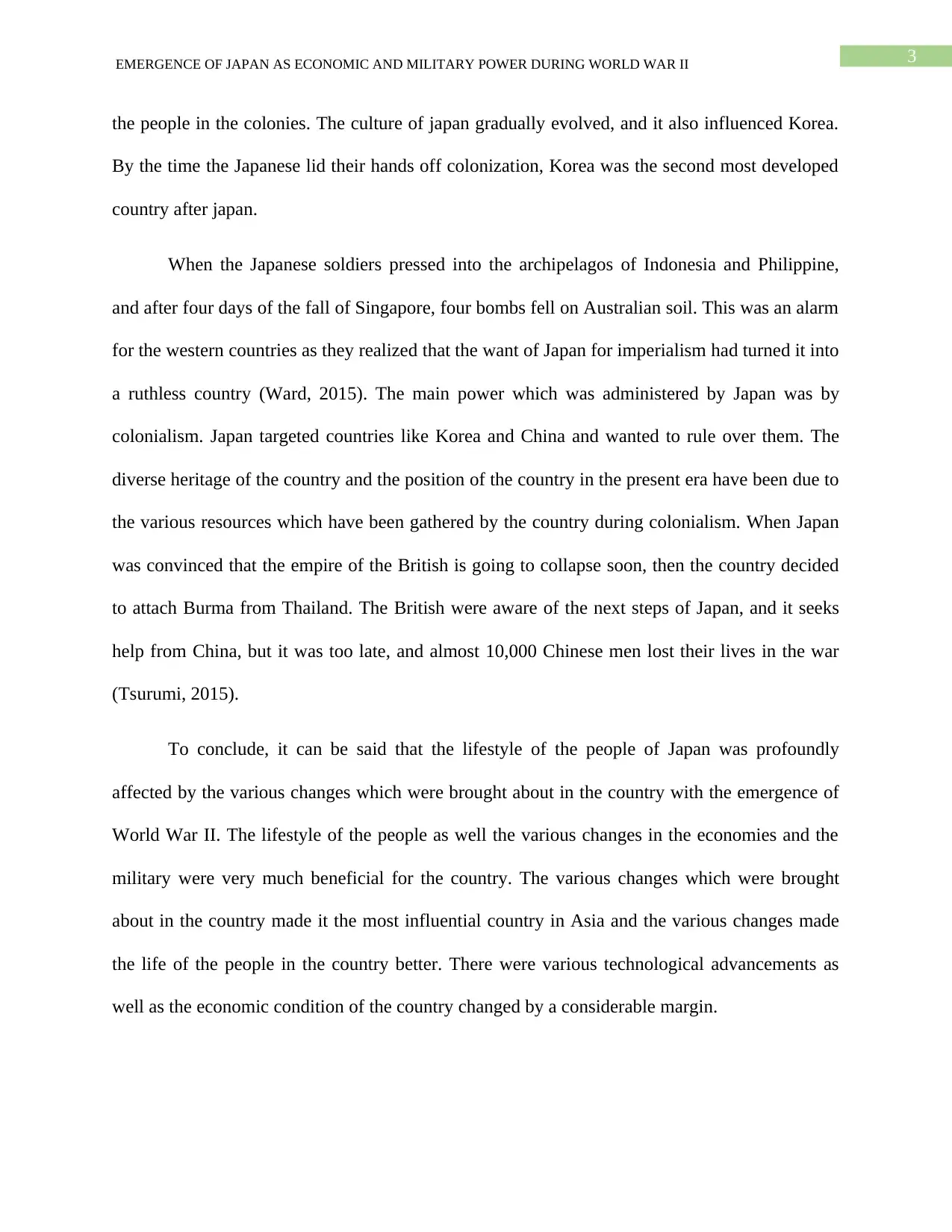
3EMERGENCE OF JAPAN AS ECONOMIC AND MILITARY POWER DURING WORLD WAR II
the people in the colonies. The culture of japan gradually evolved, and it also influenced Korea.
By the time the Japanese lid their hands off colonization, Korea was the second most developed
country after japan.
When the Japanese soldiers pressed into the archipelagos of Indonesia and Philippine,
and after four days of the fall of Singapore, four bombs fell on Australian soil. This was an alarm
for the western countries as they realized that the want of Japan for imperialism had turned it into
a ruthless country (Ward, 2015). The main power which was administered by Japan was by
colonialism. Japan targeted countries like Korea and China and wanted to rule over them. The
diverse heritage of the country and the position of the country in the present era have been due to
the various resources which have been gathered by the country during colonialism. When Japan
was convinced that the empire of the British is going to collapse soon, then the country decided
to attach Burma from Thailand. The British were aware of the next steps of Japan, and it seeks
help from China, but it was too late, and almost 10,000 Chinese men lost their lives in the war
(Tsurumi, 2015).
To conclude, it can be said that the lifestyle of the people of Japan was profoundly
affected by the various changes which were brought about in the country with the emergence of
World War II. The lifestyle of the people as well the various changes in the economies and the
military were very much beneficial for the country. The various changes which were brought
about in the country made it the most influential country in Asia and the various changes made
the life of the people in the country better. There were various technological advancements as
well as the economic condition of the country changed by a considerable margin.
the people in the colonies. The culture of japan gradually evolved, and it also influenced Korea.
By the time the Japanese lid their hands off colonization, Korea was the second most developed
country after japan.
When the Japanese soldiers pressed into the archipelagos of Indonesia and Philippine,
and after four days of the fall of Singapore, four bombs fell on Australian soil. This was an alarm
for the western countries as they realized that the want of Japan for imperialism had turned it into
a ruthless country (Ward, 2015). The main power which was administered by Japan was by
colonialism. Japan targeted countries like Korea and China and wanted to rule over them. The
diverse heritage of the country and the position of the country in the present era have been due to
the various resources which have been gathered by the country during colonialism. When Japan
was convinced that the empire of the British is going to collapse soon, then the country decided
to attach Burma from Thailand. The British were aware of the next steps of Japan, and it seeks
help from China, but it was too late, and almost 10,000 Chinese men lost their lives in the war
(Tsurumi, 2015).
To conclude, it can be said that the lifestyle of the people of Japan was profoundly
affected by the various changes which were brought about in the country with the emergence of
World War II. The lifestyle of the people as well the various changes in the economies and the
military were very much beneficial for the country. The various changes which were brought
about in the country made it the most influential country in Asia and the various changes made
the life of the people in the country better. There were various technological advancements as
well as the economic condition of the country changed by a considerable margin.
Paraphrase This Document
Need a fresh take? Get an instant paraphrase of this document with our AI Paraphraser
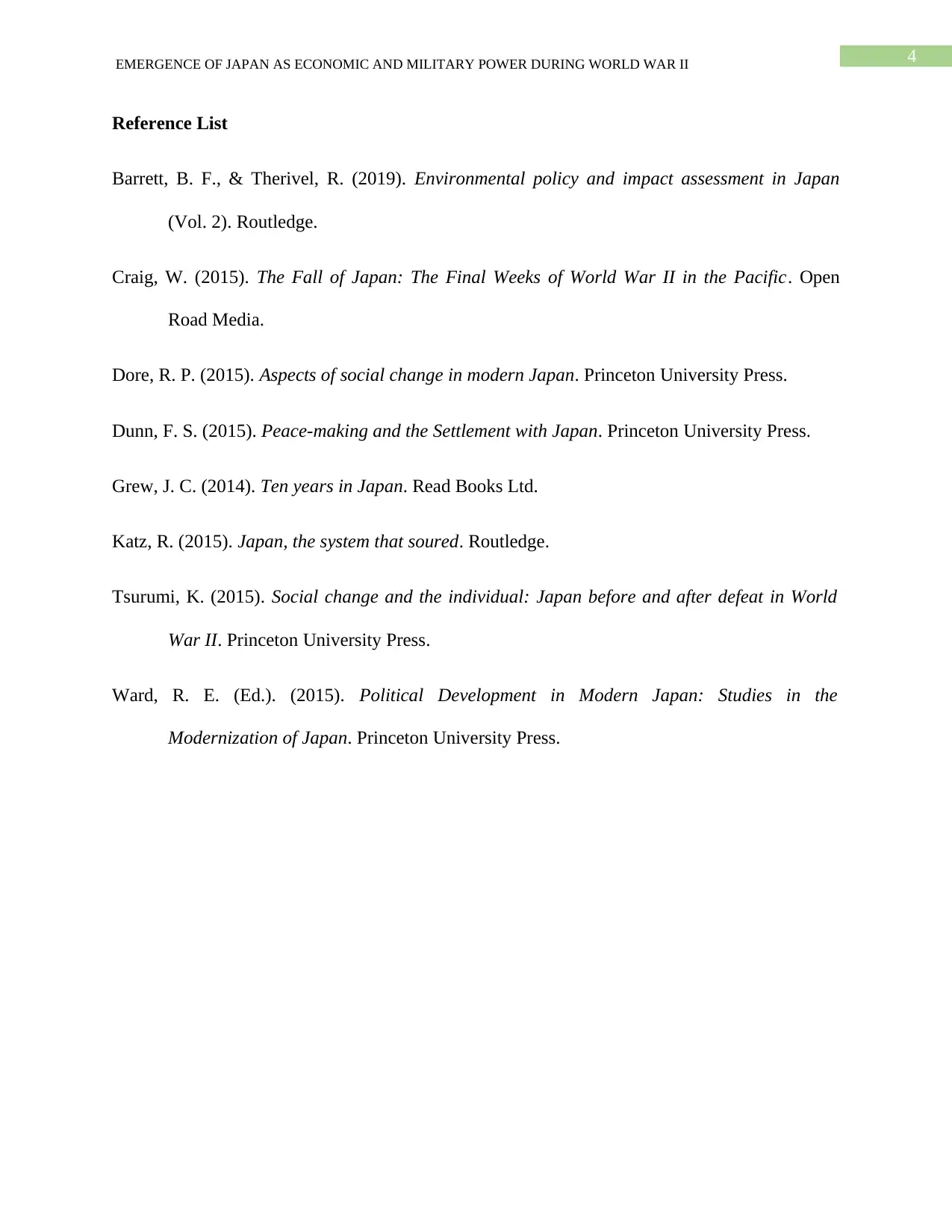
4EMERGENCE OF JAPAN AS ECONOMIC AND MILITARY POWER DURING WORLD WAR II
Reference List
Barrett, B. F., & Therivel, R. (2019). Environmental policy and impact assessment in Japan
(Vol. 2). Routledge.
Craig, W. (2015). The Fall of Japan: The Final Weeks of World War II in the Pacific. Open
Road Media.
Dore, R. P. (2015). Aspects of social change in modern Japan. Princeton University Press.
Dunn, F. S. (2015). Peace-making and the Settlement with Japan. Princeton University Press.
Grew, J. C. (2014). Ten years in Japan. Read Books Ltd.
Katz, R. (2015). Japan, the system that soured. Routledge.
Tsurumi, K. (2015). Social change and the individual: Japan before and after defeat in World
War II. Princeton University Press.
Ward, R. E. (Ed.). (2015). Political Development in Modern Japan: Studies in the
Modernization of Japan. Princeton University Press.
Reference List
Barrett, B. F., & Therivel, R. (2019). Environmental policy and impact assessment in Japan
(Vol. 2). Routledge.
Craig, W. (2015). The Fall of Japan: The Final Weeks of World War II in the Pacific. Open
Road Media.
Dore, R. P. (2015). Aspects of social change in modern Japan. Princeton University Press.
Dunn, F. S. (2015). Peace-making and the Settlement with Japan. Princeton University Press.
Grew, J. C. (2014). Ten years in Japan. Read Books Ltd.
Katz, R. (2015). Japan, the system that soured. Routledge.
Tsurumi, K. (2015). Social change and the individual: Japan before and after defeat in World
War II. Princeton University Press.
Ward, R. E. (Ed.). (2015). Political Development in Modern Japan: Studies in the
Modernization of Japan. Princeton University Press.
1 out of 5
Related Documents
Your All-in-One AI-Powered Toolkit for Academic Success.
+13062052269
info@desklib.com
Available 24*7 on WhatsApp / Email
![[object Object]](/_next/static/media/star-bottom.7253800d.svg)
Unlock your academic potential
Copyright © 2020–2025 A2Z Services. All Rights Reserved. Developed and managed by ZUCOL.





